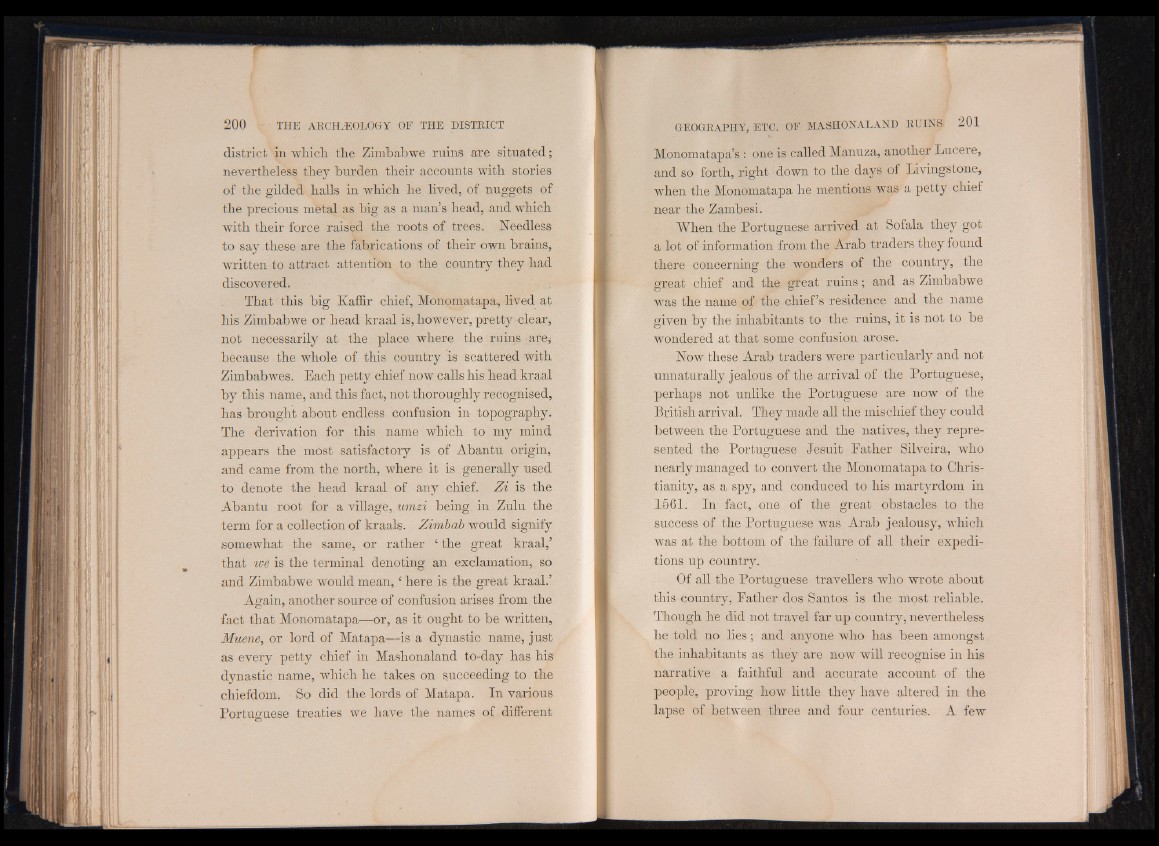
district in which, the Zimbabwe ruins are situated;
nevertheless they burden their accounts with stories
of the gilded halls in which he lived, of nuggets of
the precious metal'as big as a man’s head, and which
with their force raised the roots of trees. Needless-
to say these are the fabrications of their own brains,
written to attract attention to the country they had
discovered.
That this big Kaffir chief, Monomata.pa, lived at
his Zimbabwe or head kraal is, however, pretty clear,
not necessarily at the place where the ruins are,
because the whole of this country is scattered with
Zimbabwes. Each petty chief now calls his head kraal
by this name, and this fact, not thoroughly recognised,
has brought about endless confusion in topography-
The derivation for this name which to my mind
appears the most satisfactory is of Abantu origin,
and came from the north, where it is generally used
to denote the head kraal of any chief. Zi is the
Abantu root for a village, urnzi being in Zulu the
term for a collection of kraals. Zimbab would signify
somewhat the same, or rather ‘ the great kraal,’
that we is the terminal denoting an exclamation, so
and Zimbabwe would mean, ‘ here is the great kraal.’
Again, another source of confusion arises from the
fact that Monomatapa—or, as it ought to be written,
Muene, or lord of Matapa—is a dynastic name, just
as every petty chief in Mashonaland to-day has his
dynastic name, which he takes on succeeding to the
chiefdom. So did the lords of Matapa. In various
Portuguese treaties we have the names of different
Monomatapa’s : one is called Manuza, another Lucere,
and so forth, right down to the days of Livingstone,
when the Monomatapa he mentions was a petty chief
near the Zambesi.
When the Portuguese arrived at Sofala they got
a lot of information from the Arab traders they found
there concerning the wonders of the country, the
great chief and the great ruins; and as Zimbabwe
was the name of the chief’s residence and the name
given by the inhabitants to the ruins, it is not to be
wondered at that some confusion arose.
Now these Arab traders were particularly and not
unnaturally jealous of the arrival of the Portuguese,
perhaps not unlike the Portuguese are now of the
British arrival. They made all the mischief they could
between the Portuguese and the natives, they represented
the Portuguese Jesuit Father Silveira, who
nearly managed to convert the Monomatapa to Christianity,
as a spy, and conduced to his martyrdom in
1561. In fact, one of the great obstacles to the
success of the Portuguese was Arab jealousy, which
was at the bottom of the failure of all their expeditions
up country.
Of all the Portuguese travellers who wrote about
this country, Father dos Santos is the most reliable.
Though he did not travel far up country, nevertheless
he told no lies; and anyone who has been amongst
the inhabitants as they are now will recognise in his
narrative a faithful and accurate account of the
people, proving how little they have altered in the
lapse of between three and four centuries. A few